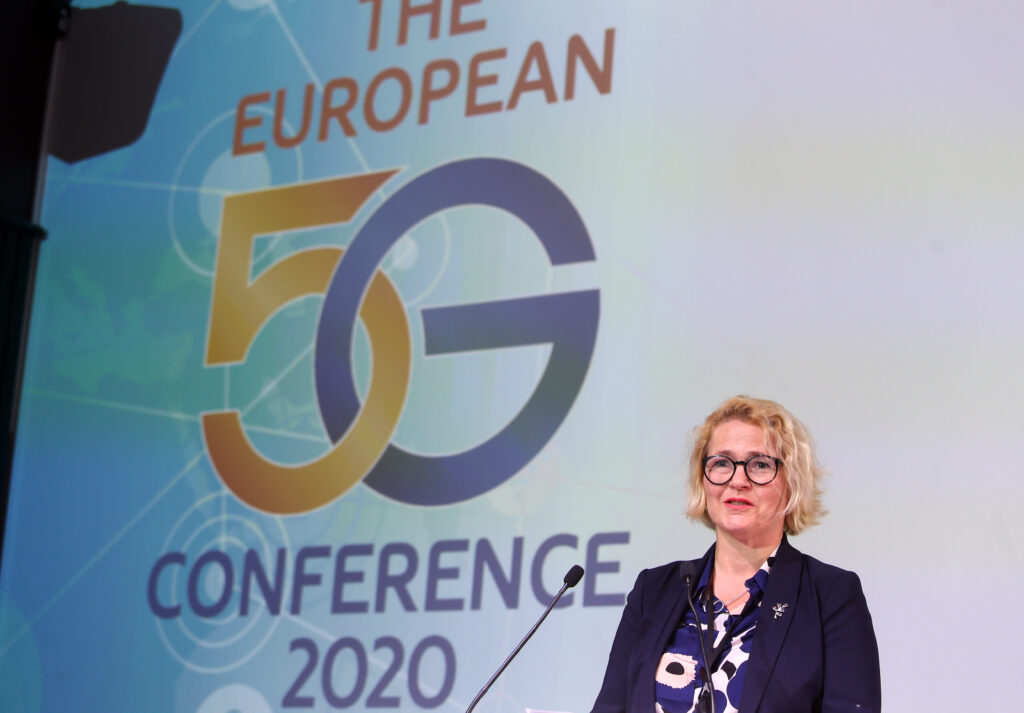Below you may find the Keynote that I held in European 5G conference, organized by Forum Europe, in 29.1.2020 in Brussels:
Let me start my Keynote with some remarks from the past, to get us in a right perspective:
It’s been more or less 160 years since the first electromagnetic telephones started to really appear. It was Alexander Graham Bell’s famous telephone that was also used when the first tele line was introduced in my hometown Vaasa, Finland, in 1882.
From the late 1800, it took around one hundred years of steady, linear conquest of telephone before the next big step: mobile telephone and first commercial cellular network was opened in 1979. The wireless revolution truly became in 1990’s, and in Finland the year 1998 was a turning point, you know why? First time there were more cellular subscriptions than regular ones. Nokia was truly connecting people in it’t country. What is the year in your country?
Since then the development has been faster and faster. Is it a bubble or will the speed of development continue was question then. Well, it lasted. I am the believer that it will continue.
Now once again, we are taking steps towards a new era. As you all know well, 5G is not just faster and better version of 4G or 4G+. It will be revolutionary, changing the way we live, think and work. It will be the cornerstone of “the digital era”, that EU is trying to reach. This we all have to bear in our minds.
5G will mean much much more data and less latency. It will be not just for consumers – faster gaming for our kids or sharper screens to watch football and opportunity to follow detail moves of your favourite player – but new business models and new opportunities, if we dare. Europe has a strong industry, and 5G is one crucial element of finding new growth.
“We have to see digitalization as an enabler.”
We have to see digitalization as an enabler: Combination of use and storage of data, artificial intelligence and ubiquitous communication (5G, fibre), we will change the world we live in. We will be able to tackle climate change better, take care of our environment, energy efficiency, we will find new ways of transport and mobility, and of course take better care of our self with eHealth.
The 5G and the data it transmits has a crucial part of this within the next 10 years. With micro networks 5G makes possible the industry will be able to connect online without separate networks can lead to better security and use of data, automatization and better use of artificial intelligence. We will have the real Internet of Things.
But in the era of big platforms huge companies outside Europe are benefitting from our personal data, it is important to ask: where are we now in Europe? How can we benefit from new technologies? How can we build European ecosystems? Do we need to ensure technological sovereignty?
One of the key messages from Commissioner Thierry Breton has been that Europe is not lagging behind in digitalization, data economy or 5G. He has underlined the fact that Europe holds 50% of the world’s patents in 5G field (when China holds around 30% and the US 14%), and our European industry includes some of the world’s most successful manufacturers. He argues, that Europe can also count on its own suppliers of 5G technologies. This morning I participated roundtable discussion, where Jean-Eric Paquet, Director-General of Research and Innovation department in the European Commission, emphasized that in EU there comes more startups that in US every year. What we lack, is the scaling up.
I quote: “Contrary to what some would like to suggest, Europe is not lagging behind in 5G. Neither in 5G technology nor in its deployment”
I sure agree with commissioner Mr Bretons attitude. Europe has not lost the battle of digitalization nor 5G – on the contrary.
“What to do?”
However, I cannot emphasize enough that we are not yet on the finishing line – not even close. We are just entering the first wave of 5G, and there is still a plenty to do, before we truly reach the 5G era. The product and the development of 5G is not ready and we have to bear that in mind.
If we fail to invest in research and development of 5G here in Europe, there is a huge risk that the European providers will fall short. We cannot waste time.
We also need to enable the fast roll-out of 5G, and make sure that the digital single market in Europe is truly working. Only this way we can benefit from digitalization, data economy and artificial intelligence – only this way we can create the new business opportunities for our industry.
The key message I have is that we need investments. In Research and Development as mentioned earlier, but also in the infrastructure and roll-out. The question is simple: without roll-out and fast deployment of 5G, we are not able to create innovative technological solutions. The competitors outside Europe will not wait. If we do not have the needed infrastructure, the innovations on 5G use will automatically develop outside Europe.
Of course the demand is a challenge and in the early stage increasing appetite would help. At first customers might be asking, why would I need the faster connections? But as it has happened before, I am sure that the reality will come. Who would be satisfied with GSM today, cut in the middle of data use on mobile? However, the question remains: when will the consumer demand boom or is 5G more likely to boom first in hubs like industrial plants, harbors, universities, hospitals.
2025 Gigabit society targets the EU has emphasised, how connected Europe should be in 2025:
1) in Every socio-economic drivers, academic, R&D, hospitals etc should have at least the connection for 1GB.
2) All households should have at least 100 MB connection, but upgradeable to 1GB.
3) All urban areas, and main roads & railways should have 5G.
Where are we? The Commission calculates that for the current targets, there is a funding gap of €155 billion which will be mainly due to the fiber bias. And for the 5G, “the backbone” also matters. Europe’s headline “gigabit society” connectivity targets are ambitious for fiber but one could argue that they are modest for 5G. We have much more knowledge about 5G than was available when the current targets were developed. Would we need a review of the targets?
It is important that EU has its regulatory framework right to support the roll-out and investments – we truly need the infra. We have the Connecting European Facilities, which are aiming to help especially the roll-out of 5G, sub-program on 5G deployments at major European transport routes in “hot spots” and in hubs. In Digital Europe we will support digitalised services, competences and knowledge and of course in Horizon Europe, Research and technology development. From my point of view, it is important, that Europe delieverers with these budgets. I’m proud that EP also see this importance when finalizing the MFF negotiations.
As it was in 2019, also in 2020 Europe will continue to lag behind leading regions in 5G investment, deployment and adoption: South-Korea, Japan, China and USA will have more 5G cellsites per population, compared to Europe. To South-Korea, Japan and China, the difference is quite significant.
But not every part of EU is the same. In December 2019 there were only 11 Member states in EU that had a national roadmap to 5G and eleven 5G cross border corridors.
Now we have to implement the already created programmes. For example, in the EECC (code) a time table was set for the 5G spectrum auctions in Europe. Still, many countries are lagging behind: only 16,5 % of the 5G spectrum is assigned and usable in EU (December 2019). Many countries have not even started. In Europe there is many areas that has very high tenacity and which are highly competitive, but unfortunately this is not the story everywhere. Of course member states have different backgrounds, but we should encourage and also demand courage for future investments: no one in Europe should be left behind. Making sure that implementation is made accordingly, is a big step forward.
Europe has patents, companies, industry, tenacity and regulation. What we need, is investments. Infra investors demand customers who wants 5G. Europe needs its own and innovative ecosystems based on our values.
“Spectrum: Currently there is uneven situation in Europe.”
I would also like to rise couple of areas that the new commission could look into: First, Spectrum policy. Currently there is uneven situation in Europe, which can be seen slowing down the roll-out. I would like to ask, would it be reasonable to demand less money from the auction, more money to roll-out and infrastructure? Are some MS now cashing out just from the spectrum auctions, and harming the investments to the roll-out? It is sad how diverse the spectrum markets are. Member states believe into their own spectrum policies, quick monetization with Spectrum sales maximizing the price.
Should they instead boost companies to invest with reasonable price to the spectrum but with obligations on usages and coverage. We could not work on this during last two regulation cycles as far as I know, I only was in charge on behalf of S&D on the so called code – telecom package. Now companies pay in some states billions of euros (eg Germany 6.5 billion euros, Italy 4,2 billion (2,2 for mid-range), Finland 77 million. Comparison D to FI: 15 times bigger than Finland in population, so prize was 5 times higher per population).
Right now commission and parliament are working on new industrial strategy. I argue also that it would be important to carefully assess, how to enable that there is enough spectrum available also for the micro grids for industrial plants or highly crowded areas. There is different national solutions at the moment. Should operators have obligation to give micro grids for sites? Or should a slice of spectrum be addressed to new innovative micro operators in the spectrum auctions? All in all, it is crucial for industry, B2B data economy and automatization to have the micro network at plant sites or in highly crowded events working.
Also review of the Broadband Cost Reduction Directive would be reasonable to assess: 5G needs the fibre backbone. There is need to streamline, simplifie and light-touch administrative procedures in the Directive, e.g. less/no permits, shorter and electronic procedures, one-stop-shop approach. The directive should also be alignment with the code (EECC), especially focusing on complementarity while removing and avoiding overlaps.
“Deployment of 5G will change the paradigm in security.”
Finally I would like to take a note on security: the roll-out and deployment of 5G will change the paradigm. 5G will be a multipurpose technology and infrastructure, central to our European societies, economy and competitiveness. It will be the fundamental infrastructure to connect, steer and control key operations in central and vulnerable sectors in Society (transport, health, energy etc).
This provides challenges in terms of cyber and national security.
Due to the new in technology, 5G is more vulnerable for attacks: 1) Potential “attack surface is bigger, the intelligence is distributed all over the network. 2) Exposure to malicious actors will increase in an IoT world where literally everything can be equipped with sensors, some processing power and connected. I know legislation in Finland makes it possible to take down part of the network if there is malfunction. Also reporting is a good tool, in EU sharing experiences as well.
Europe should promote its own capacity, knowledge and ecosystems – I want Europe to be a global player, not a playground for others. This holds in creating economy and jobs in Europe. We also have to uphold our European values, and set European standards, e.g. GDPR. I think that, in line with Commissions statements, we also have to address more Digital and technology sovereignty. World has become a more unpredictable place. Therefore I am welcoming the NIS and member state cooperation and common guidelines for member states (5G toolbox) together with the EC.
I think that as a part of the internal market, EU need its common approach to the security of 5G, address the threats and have a harmonized quality criterion for secure 5G networks which will take into account technical and non-technical measures that members states can then adapt.
I think we should see the opportunities of the digitalization, of course while simultaneously taking care of the security aspect. There lays a huge potential for Europe in 5G, data economy and artificial intelligence. We have ambitious political aims: Green Deal for sustainable growth – digital solutions can help!
The citizens of Europe are aging, and the population is more or less remaining stabile. We do not afford to lag behind. Referring to the brief lecture of the telecommunication history that I had in the beginning of my speech, the cycle of development is getting faster and faster. If we want to create wellbeing and new jobs and innovations, we need actions and courage, we need to trust to the future and take the necessary steps to jump into it.




